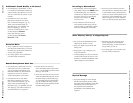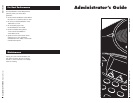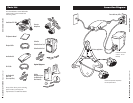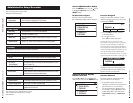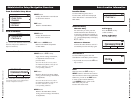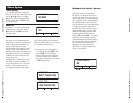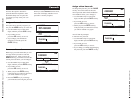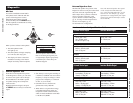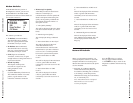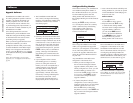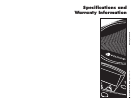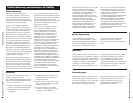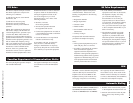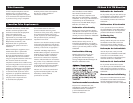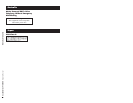
SoundStation VTX 1000 Operation Manual
50
Warranty Information
SoundStation VTX 1000 Operation Manual
51
Warranty Information
This device complies with part 15 of the
FCC Rules. Operation is subject to the
following two conditions:
(1) This device may not cause harmful
interference, and
(2) This device must accept any
interference received, including
interference that may cause undesired
operation.
NOTE: This equipment has been tested
and found to comply with the limits for
a Class B digital device, pursuant to part
15 of the FCC Rules. These limits are
designed to provide reasonable protection
against harmful interference in a residential
installation. This equipment generates, uses
and can radiate radio frequency energy
and, if not installed and used in accordance
with the instructions, may cause harmful
interference to radio communications.
However, there is no guarantee that
interference will not occur in a particular
installation. If this equipment does cause
harmful interference to radio or television
reception, which can be determined by
turning the equipment off and on, the
user is encouraged to try to correct
the interference by one or more of the
following measures:
Reorient or relocate
the receiving antenna.
Increase the separation between
the equipment and receiver.
Connect the equipment into an outlet on
a circuit different from that to which the
receiver is connected.
Consult the dealer or an experienced
radio/TV technician for help.
In accordance with part 15 of the FCC
rules, the user is cautioned that any
changes or modifications not expressly
approved by Polycom Inc. could void the
user’s authority to operate the equipment.
FCC Rules
This Class [B] digital apparatus complies
with Canadian ICES-003.
Cet appareil numérique de la classe [B]
est conforme à la norme N M B-003 du
Canada.
Canadian Department of Communications Notice
This equipment complies with part 68
of the FCC Rules. Please refer to the
labeling on equipment for the following
information:
Registration Number
Ringer Equivalence
Grantee’s Name
Model Number
Serial Number and/or Date of
Manufacture
Country of Origin
If requested this information must be
provided to the telephone company
Notes:
This registered equipment may not be
used with party lines or coin lines.
If trouble is experienced, the customer
shall disconnect the registered
equipment from the telephone line to
determine if the registered equipment is
malfunctioning and that if the registered
equipment is malfunctioning, the use of
such equipment shall be discontinued
until the problem has been corrected.
If, in the unlikely event that this
equipment causes harm to the network,
the telephone company will notify
you in advance that temporary
discontinuance of service may be
required. However if advance notice
is not practical, the telephone company
will notify you as soon as possible.
Also, you will be advised of your right
to file a complaint with the FCC if you
believe it necessary.
The telephone company may make
changes to its facilities, equipment,
operations or procedures that could
affect the operation of the equipment.
If this happens, the telephone company
will provide advance notice so you can
make the necessary modifications to
maintain uninterrupted service.
US Telco Requirements
The REN is used to determine the quantity
of devices that may be connected to the
telephone line. Excessive RENs on the
telephone line may result in the devices
not ringing in response to an incoming
call. Typically the sum of RENs should
not exceed five (5.0). To be certain of the
number of devices that may be connected
to a line (as determined by the total RENs)
contact the local telephone company.
REN
WHEN PROGRAMMING EMERGENCY
NUMBERS AND/OR MAKING TEST
CALLS TO EMERGENCY NUMBERS:
1. Remain on the line and briefly explain
to the dispatcher the reason for the call.
2. Perform such activities in the off-peak
hours, such as early morning or late
evening.
Automatic Dialing



